Orda Interviews Residents of Petropavlovsk's Flooded Suburbs
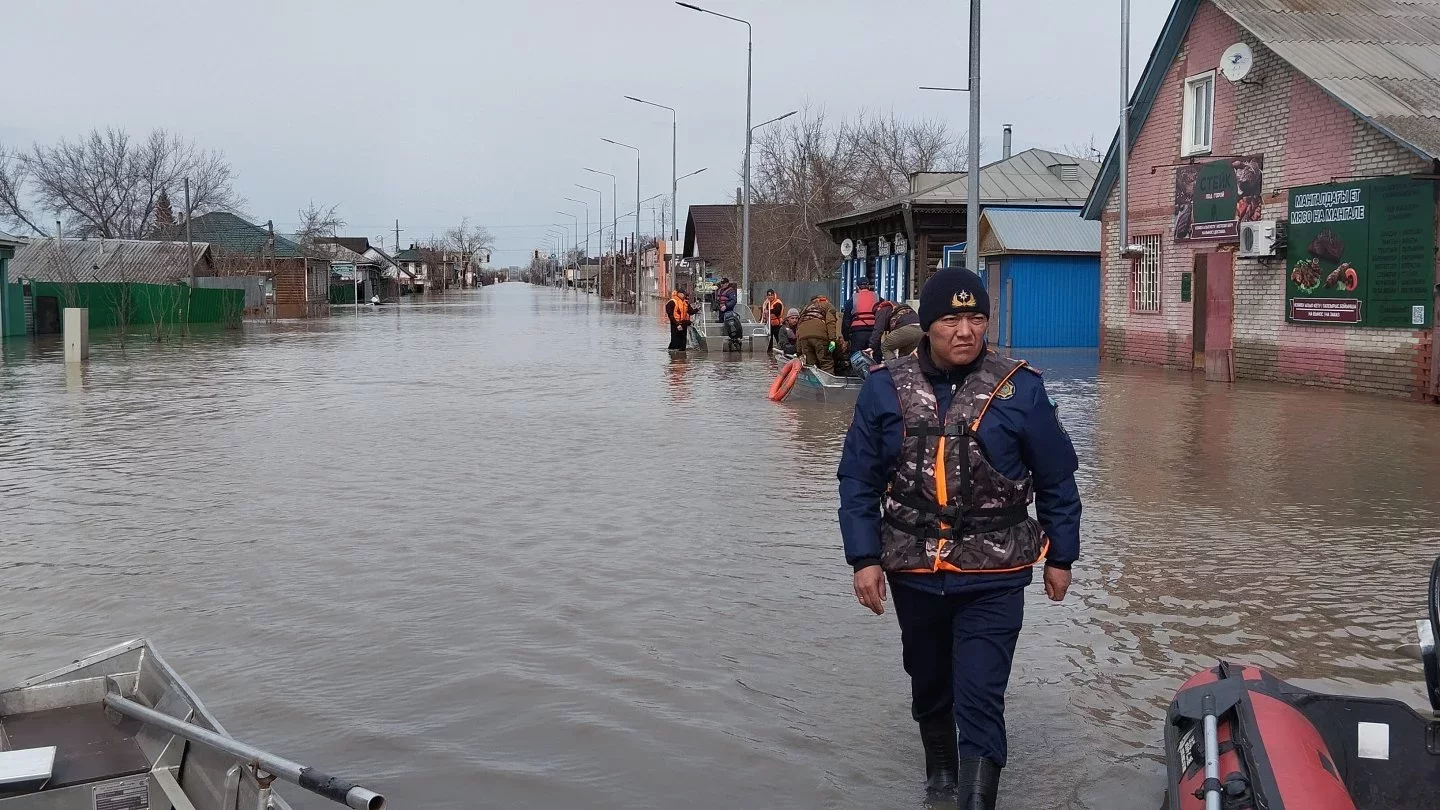 Photo: Orda
Photo: Orda
On the morning of April 18, Petropavlovsk News reported that the amount of payments for the affected residents of the region would be 100 MCI. 200 had been the initial number. During his visit to Petropavlovsk, Qasym-Jomart Toqayev also stated that the payments to be issued would amount to 100 MCI. Authorities have clarified that this is a one-time relief payment, whereas compensation will be issued later.
Desperate
Unable to stay with relatives, some residents, mostly the sick and the elderly, huddle in the gyms of schools and colleges and assembly halls of cultural centers. These people have lost everything in a matter of days. Among them are 36 residents of the village of Zarechny. Zarechny was submerged on April 9.
Some of them are unable to even get out of bed. The rest are sorting humanitarian aid brought by representatives of various foundations and volunteers: food, personal hygiene products, clothes, shoes, and bed linen.
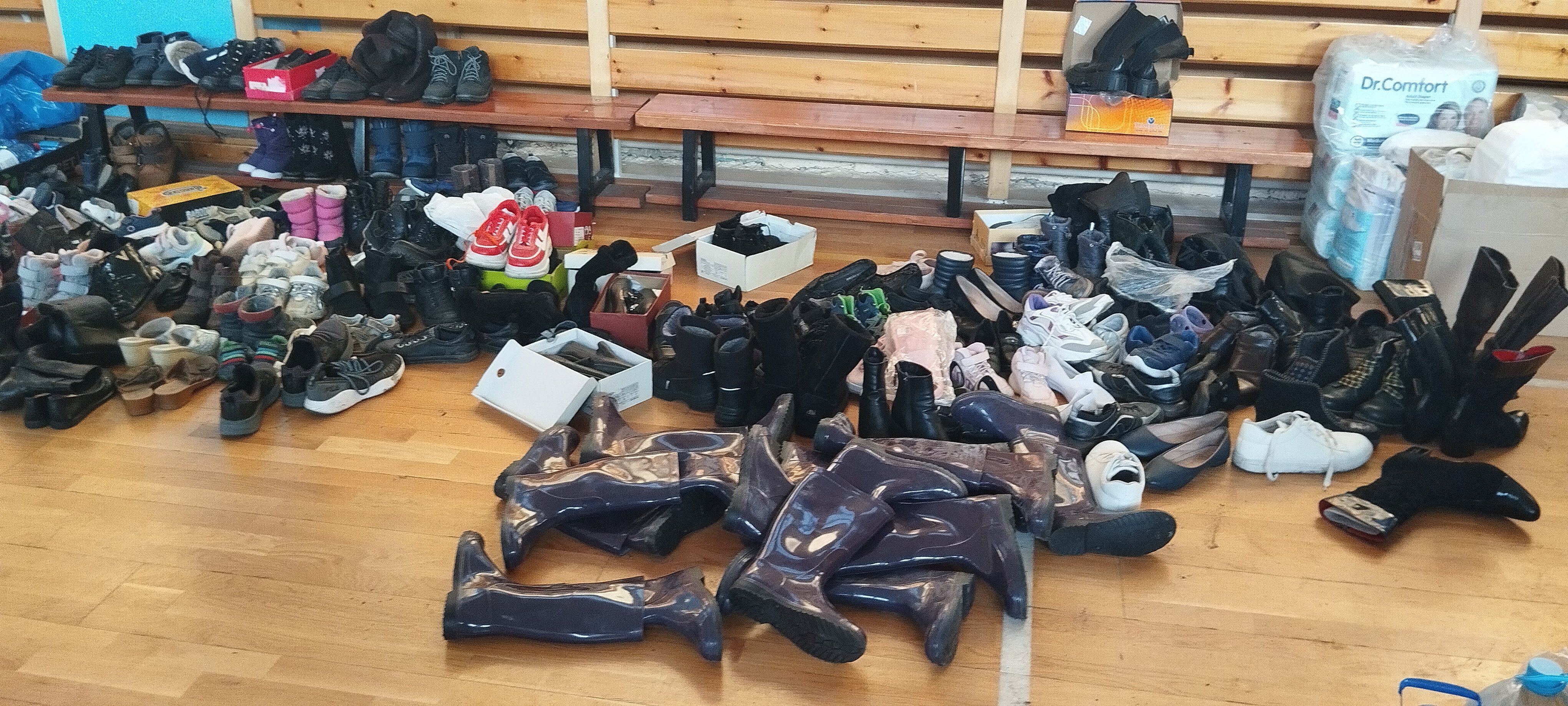
Schoolchildren are learning online. The school staff, on the other hand, are at their workplaces. Tables with computers have been set up at the entrance to the gym. Teachers explain how people can have documents reissued, fill out applications, and whom to contact for financial assistance and social support.
Vera lived in Zarechny. Her only son died a few years ago in a car accident near Yekaterinburg. Her daughter-in-law demanded she leave the home bought with money from the sale of Vera's apartment in Petropavlovsk. The woman's remaining savings were only enough for a small house in the suburbs. Vera planned to live out the rest of her days there.
Rescuers arrived in the afternoon, they told us to prepare for evacuation — there was water, but we had no light at that time, neither the radio nor the TV were working. Well, I thought maybe it would flood. Just in case, I took all my things to the second floor, went to bed in the attic by myself. It seems to me that it was already dark when the buses arrived, they said, take documents, take money, and leave. I opened the door, and there was already water. Everywhere. I jumped into a car in what I was wearing, Vera says.
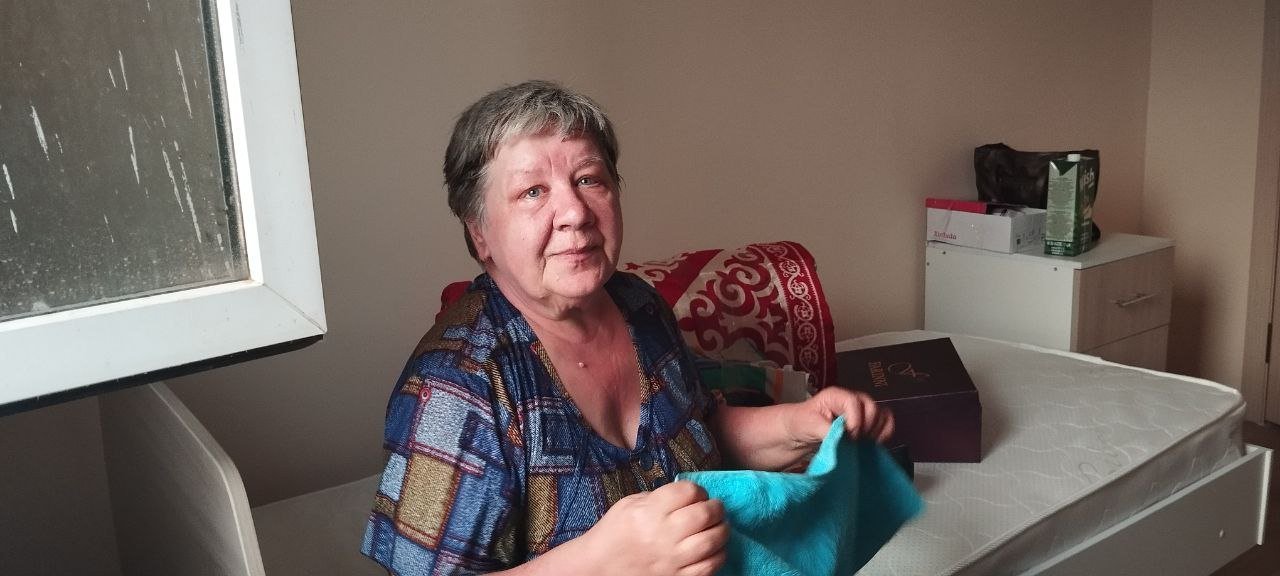
Vera was in tears when we met her. It turned out that she was upset not only about her house:
— They bring clothes to us every day. The volunteer, the girls, bring it to me. I try to put it on, but nothing fits me, I'm a size 62-64. And there is nothing. I wear a mere robe. I wash it at night, put it on the radiator, it dries by morning, I put it on again. Because I don't have anything else. I can't even go to the administration, as I'm ashamed to go to the city like this.
— And what is needed?
— Oh, anything, at least a windbreaker, any color, just not black... A tracksuit so that I could at least go somewhere. But not cellophane, like a bag. And some size 43 shoes. And that's all I need. I can't go to the city like this because even though I'm old, I'm a woman.
As it turned out, the pensioner and her problems were known about at the humanitarian aid point. A couple of hours later Stanislav, a man who relocated from Russia and has been living in Kazakhstan for the second year, called us. Like many other Petropavlovsk residents, Stanislav has been working as a volunteer since the onset of the flood. After learning about Vera's problem, in the evening he said that he had managed to find clothing of the right size.
Lay The Bottom Bare
The water level in the Yesil River continues to drop. The water recedes, exposing the true scale of the destruction. The decrease in water seems to reflect the level of trust in the authorities. If life goes on as it was on the central street in Petropavlovsk, then the situation in evacuation centers on the outskirts is tense.
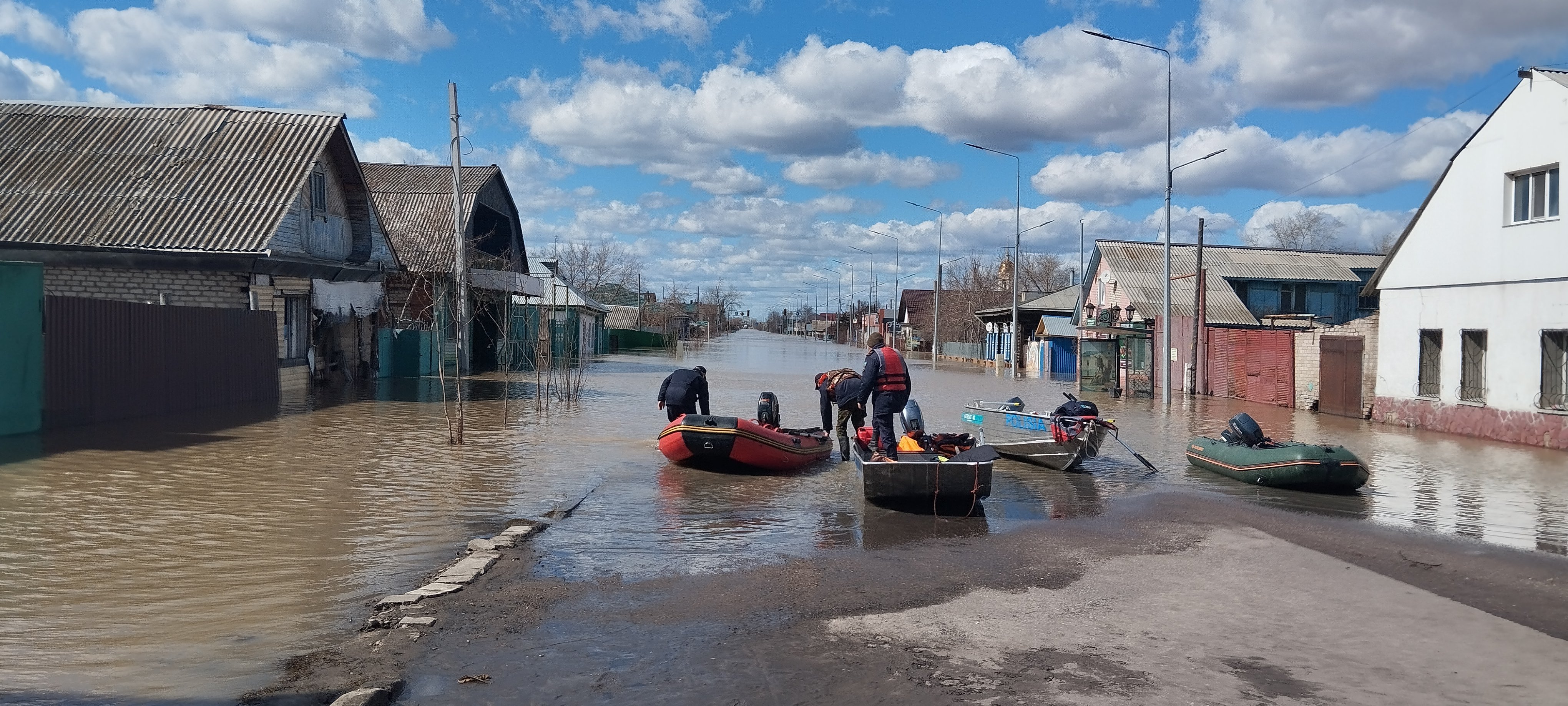
In another evacuation center in Petropavlovsk, a group of pensioners from flooded villages wholeheartedly thanked the woman bringing in another batch of humanitarian aid to the gym: clothes, medicines, and basins. The woman asked not to record her. Only after the Orda journalist put away their phone, did she admit that she had bought and brought it in at her own expense:
— I don't trust the state anymore. After what happened, and how they let all this happen, I finally realized that there was no one else to rely on except for your own strength. My house was flooded, but they refused to compensate me: they replied that the damage was minor. Well, it was impossible to expect anything else.
When my daughter found out that I was flooded, she set up a fundraiser, I told her — daughter, everything was fine with us, it wasn't that bad. She said to me, Mom, I don't know anything, we've already raised the money. If you don't need it, send it to someone who's truly hard-set.
My husband and I thought: 'Who can we help?' Then we decided that we would just buy things and bring them.
— So who is helping?
— The same simple people help — not the Akimat, not the government, but locals. Entrepreneurs, social activists. Both those who are here and those who have left send us money from everywhere: from Russia, from Germany, from all over the world. Just because people are like that because there is no state here.
— What about the payments?
— What payments? The compensation that was 200, now 100? Don't make me laugh. How many times have people been deceived? But okay, we're well—off... And what should people from the village do? Salaries are 50-60 thousand tenge, they are in loans up to their ears. Everything they lived for is gone. And no one will come to their aid. Mark my words!
The woman explained why she refused to speak on camera - she works in the public sector. In other words, even extremely cautious state employees are already criticizing the authorities.
Nowhere to Go
Nikolai, like Vera, was among the first to be evacuated from Zarechny. He keeps his phone on hand, documenting everything that happens in the evacuation center on camera. He shared that only the ridge of the roof remained of the house that he had built for several years.
— I go to the road every day. With binoculars. I watch the water go away, but I can't get closer to the house, the police won't let me. But I can see through the binoculars that there's nothing to come to anymore. The house was flooded, the roof was smashed by ice...
Nikolai says that he sent his daughters and wife to his grandmother. He decided to stay in the evacuation center closest to his native village to keep an eye on the situation.
— Have they told you anything about deadlines or aid?
— What help? Who said?
— Well, officials, representatives of the Akimat...
— These... What's the use of what they say? They come and talk and talk every day... And as for listening to them, they don't do anything, haven't done anything and won't do anything, they just talk.
— Perhaps they told you when you could come back?
— Where to go back to?! I don't have anything else. Zero, zilch. All that I made, I built, I went hungry, but I built. I'd been building for a long time. That's it. There is no more of this.
— They should have said when and where you will be relocated..?
— I have nowhere to be relocated to. They'll kick me out of here, I'll go to the pipes near the Akimat. We're all going there.
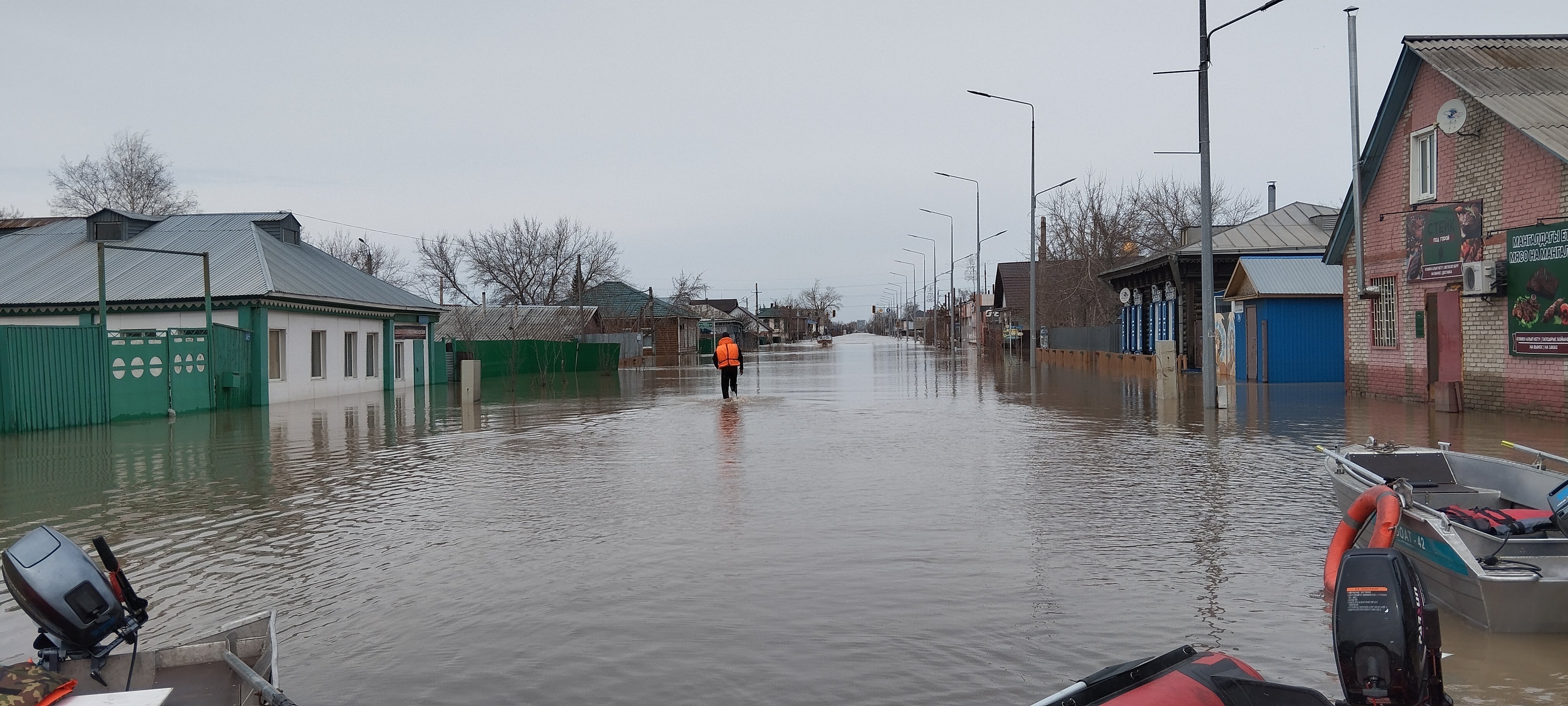
Nikolai's salary is 80 thousand tenge. This income is not enough to restore either his house or rent housing for his family in Petropavlovsk.
The man believes it was possible to prevent the flooding by systematically draining water from the reservoir throughout the winter, preventing overflows. This was not done, though.
Nikolai does not see a reason to hope that someone will be held accountable.
— And what do you think can and should be done? Who should be reached out to?
— I know what to do about it.
— What?
— I have an opinion. But I'll hold onto it. For now.
Clean Shoes
According to volunteers, who have been there since the beginning, almost no one knew how to handle the situation.
— There was almost no state. There were not enough people, neither the military nor the rescuers had any provisions. When they tried to set up a dam, it got to the point that they had to ask the locals for shovels. They bought the bags themselves, filled them themselves, and fed the military themselves. Instead of a field kitchen, Tajiks came here with pilaf, carrying pilaf knee-deep in the water. It is necessary to get people out when the water has already started, fishermen and hunters arrived, inflated the boats themselves, sailed off to rescue themselves. And where is the state? It was only two or three days later that a minister and officials arrived, and this is some kind of sur (word referencing surrealism - Ed.). We're all in the water, in the mud, hungry. And they came in clean shoes, suits, strutted around, took pictures. Got into a car and drove away.
— And in your opinion, ministers should toss around dirt?
— Why? At least just to look appropriate — what, they don't have overalls? So as not to stand out so much.
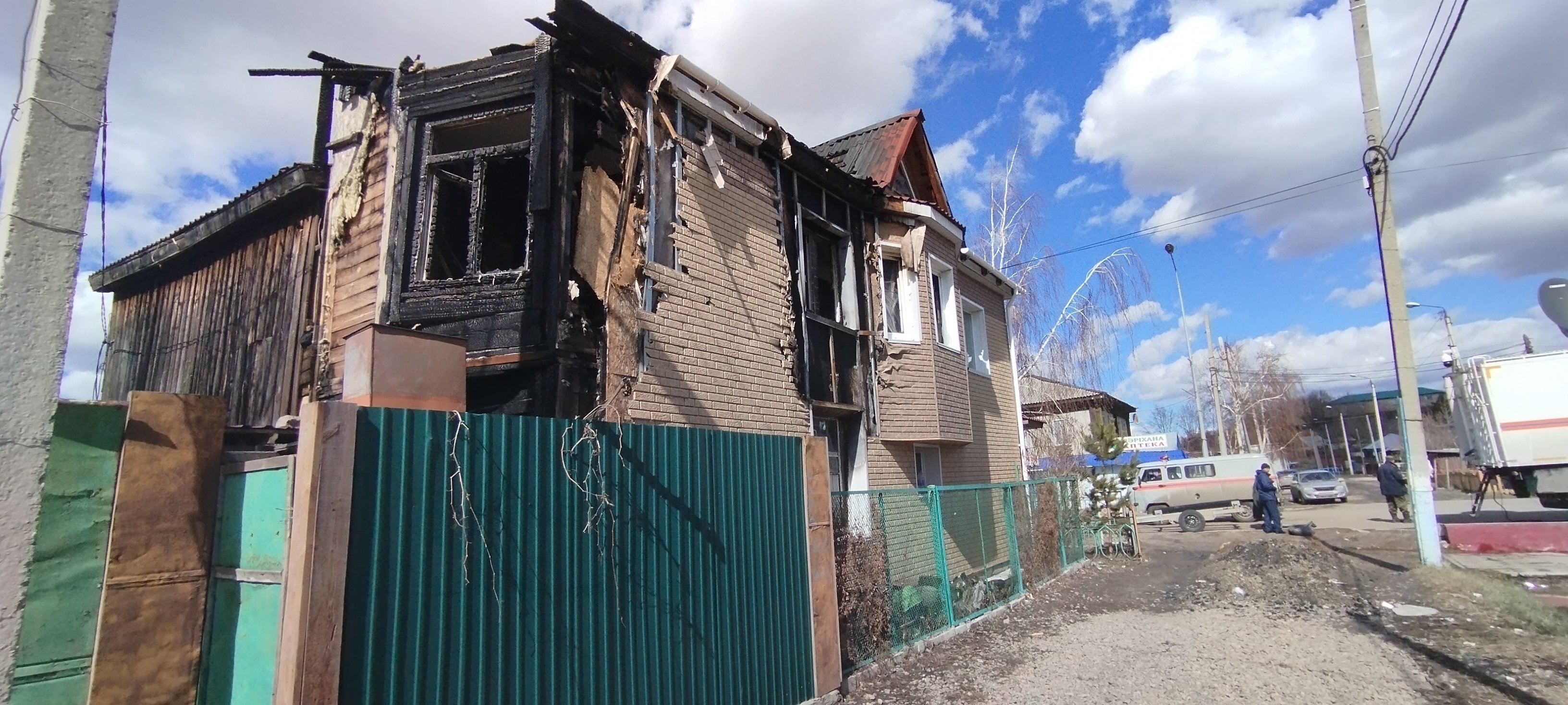
More than 10 thousand people have been evacuated from the flood zone in the North Kazakhstan region. The water is slowly receding. However, it will be possible to assess the extent of the damage only after the return of the Yesil River to its banks. Urgent measures must be taken nonetheless, otherwise, their lack thereof could spell trouble for the North Kazakhstan region.
On April 21, 2024, The Press service of the Akimat of Petropavlovsk would later issue a statement regarding the situation:
The information in the article on the ORDA.KZ website dated April 20, 2024 “I don’t trust anymore” is untrue and, in general, is presented with bias without taking into account the work actually carried out by the state
✔️Firstly, regarding the one-time payment to the victims, we clarify that the Head of State did not make a statement about reducing social payments from 200 to 100 MCI. In his speech, the President announced that throughout the country all victims would be paid compensation in the amount of 100 MCI, including in the city of Petropavlovsk. It should also be noted that, according to current regulations, at the time of the declaration of the emergency in Petropavlovsk, a one-time payment of 100 MCI was in effect. To date, 1,717 families in North Kazakhstan region have received one-time assistance in the amount of 634 million tenge.
✔️Secondly, in 2017, flood victims received a one-time compensation in the amount of 226 thousand tenge. In total, 119 people received one-time compensation in 2017 for a total amount of 27 million tenge.
✔️Thirdly, the victims were evacuated in advance and placed at specially prepared official primary evacuation points in schools and colleges, about which the population was notified in advance. This practice is used all over the world. According to a pre-developed evacuation plan, the personnel of these educational institutions temporarily provide work on site. In total, there were 12 evacuation centers throughout the city, where 436 people were located.
Before the housing issue was resolved, all residents evacuated to schools were moved to new dormitories. On April 18, 2024, the first dormitory, designed for 244 places, was occupied. The rooms have all the conditions for comfortable accommodation. Today they began moving those affected into a second similar dormitory. Over 3 days, 488 people were provided with temporary housing.
There is another dormitory with 300 beds in reserve.
✔️Fourthly, there is a single humanitarian aid reception point based in the wholesale distribution center of Raduga LLP, which receives all heavy vehicles and distributes them to distribution points. In addition, there are 3 official distribution centers in the city. Thus, at the Karasay stadium, assistance is being provided to residents of the Podgora district, for residents of the microdistrict "Zarechny" assistance is being provided at the Olympic reserve school. Residents of the Khromzavod and Kirpichny microdistricts receive humanitarian aid at 48 Chkalova Street. It should be noted that each street is assigned to the eldest of the affected residents, who draw up lists and needs and, in general, supervise the distribution.
✔️Fifthly, those affected will receive compensation for property damage. The commission will be able to make an assessment after the water has completely left the territory of the houses. If the housing is damaged or is not suitable for living, the state will make repairs or build new housing, or other housing will be purchased
✔️Sixthly, 5,166 employees of various services have been engaged in flood control measures, including over 600 military personnel from other regions, who have been provided with everything necessary. During the entire period of their service in the region, no complaints or appeals were received from these units, also to medical institutions. Also, about 3 thousand volunteers and city residents took part in the struggle against the flood.
✔️In general, during the flood period in North Kazakhstan region, 942 units of special equipment, 495 motor pumps, 131 watercraft, and 3 aircraft have been used. Around the city, 26 km of earth walls have been erected, 336 thousand bags laid, and storm sewers with a length of 226 km cleared.
❗️Dear journalists, when publishing information, please be guided by official sources. If necessary, in accordance with applicable law, you can request information from government authorities.
Original Author: Nikita Telizhenko
DISCLAIMER: This is a translated piece. The text has been modified, the content is the same. Please refer to the Russian version of the article for accuracy. Please refer to the Akimat's press release for accuracy. The article was originally published on 20/04/2024. It has been updated to reflect the current situation as of 22/04/2024.
Latest news
- Oil Smuggling Trial Begins in Aqtau Over Seized Tanker
- Armenian Foreign Ministry Open to Outsourcing Transport Corridor Oversight
- A Second Kazakhstan-Born Individual Convicted of Treason in Russia This Month
- National Fund Council: Toqayev Receives Tie-Breaking Vote Power
- Kazakhstani Caught With Fake Passport in Bulgaria Fears Extradition
- Rubio and Lavrov Hold Talks at ASEAN Summit Amid Escalation in Ukraine
- Asset Recovery: Price on De Beers Earrings Cut by 23 Million Tenge
- Pashinyan and Aliyev Discuss Normalization Efforts in Abu Dhabi
- What Will Be Considered Stalking? The Ministry of Justice Explains
- Kazakhstan Prepared to Build Karachaganak Gas Plant With Alternative Contractor if Needed
- Former Russian Orthodox Priest Launches Petition for Constantinople Church Presence in Kazakhstan
- Asset Recovery and Management Company Launches New Auction for Land in Nazarbayev’s Hometown
- Olzhas Bektenov Discusses Digital Innovation and Travel Safety with Yandex Qazaqstan
- Man Detained over Attempted Arson at House of Ministries Entrance
- Producer Says Zemfira Concert Canceled Due to Poor Planning
- Kazakhstan's Energy Minister Comments on Russia–China Gas Pipeline via Kazakhstan
- UN Working Group Says Gulnara Karimova Was Arbitrarily Detained, Uzbekistan Responds
- Perizat Kairat Claims Abuse in Detention
- U.S. Senate Considers Julie Stufft for Ambassador to Kazakhstan
- Leviathan vs. Orda: Gulnara Bazhkenova Speaks Out on Efforts to Seize Her Media and Threats to Her Life

